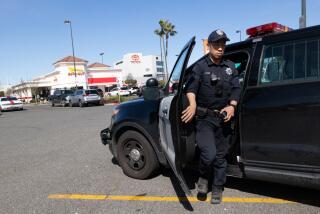Justices to Decide if Running From Police Is Citizen’s Right
- Share via
WASHINGTON — The scene is repeated every day in every part of the nation.
A police car turns the corner, and the young men scatter. Some walk away or duck behind a building, and some run.
Is their flight so “inherently suspicious” that it justifies the police chasing and apprehending those who ran?
Or does every American retain the right to run away from the police, so long as there is no other evidence of a crime in progress?
The Supreme Court took up those questions Tuesday in a Chicago case that should clarify the rules for routine street encounters between the police and citizens.
Clinton administration lawyers and state prosecutors urged the court to give the police broad power to pursue and question anyone who runs away.
An “unprovoked flight from police officers” is reason enough to stop and detain a citizen, the administration argued. “The normal rule is that innocent people don’t flee from the police,” Malcolm L. Stewart, an assistant U.S. solicitor general, told the court.
But several justices pointed out that a reasonable and innocent person might want to get away from a confrontation between the police and neighborhood drug dealers. Bullets could fly.
Others, including young black men, might fear the police because of past unpleasant encounters.
“Is there a right for them to just go their own way, to just walk away?” asked Justice Sandra Day O’Connor.
No, the government lawyer replied. “There is no right to avoid police contact.” The streets and parks are not truly private spots but rather public places that must be patrolled by the police, he said.
Walking away from an officer is usually not suspicious, he added, but running is a “panicked reaction” that signals guilt.
Another justice asked whether the police have the same broad authority in “elegant neighborhoods” as well as so-called high-crime areas.
Yes, Stewart responded. Fleeing from the police on a quiet, suburban street is “just as suspicious” as running away in an inner-city neighborhood.
The case before the court arose when four police cars turned onto Chicago’s West Van Buren Street on a September day in 1995. The area was known for drug dealing, and an officer spotted William Wardlow fleeing down an alley.
He cornered Wardlow, did a “pat down” of a plastic bag he was carrying and found a loaded revolver. The man was arrested on the gun charge.
But a Chicago judge and the Illinois Supreme Court threw out the charges and ruled that the police had violated the 4th Amendment when they chased and detained Wardlow. The Constitution “protects the right of law-abiding citizens” to avoid the police, the state judges said.
James B. Koch, a Chicago defense lawyer, urged the justices to uphold that decision.
“A flight alone is not enough to justify a [police] stop,” he argued. Under the Constitution, “you have a right to eschew involvement with the police . . . to come and go as you please.”
Justice Antonin Scalia interrupted to disagree.
“He sees the officer and runs. Do you seriously contend that doesn’t raise a suspicion?” he asked in an incredulous tone. Innocent people might be stopped and questioned, the justice acknowledged, but that is a “necessary part of maintaining safety on the streets.”
In their comments and questions, the justices signaled they were wary of giving the police blanket authority to stop all fleeing persons or, conversely, to rule that the police can never chase a person who flees.
However, the majority seemed inclined to rule for the Illinois prosecutors and to uphold the search of Wardlow. O’Connor suggested the “totality of the circumstances,” including fleeing from police in an area known for drug dealing, justified the search of the Chicago man.
The court is expected to hand down its ruling in Illinois vs. Wardlow, 98-1036, in several months.
More to Read
Get the L.A. Times Politics newsletter
Deeply reported insights into legislation, politics and policy from Sacramento, Washington and beyond. In your inbox twice per week.
You may occasionally receive promotional content from the Los Angeles Times.











